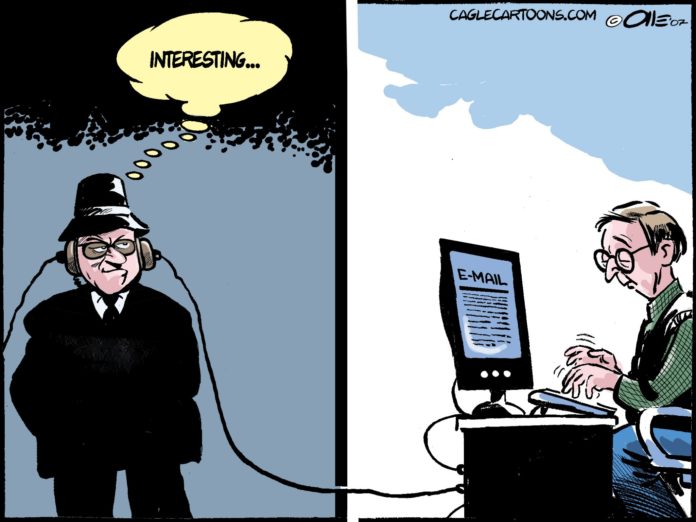BY RALPH NADER
 Here’s a dirty little secret you won’t see in the daily papers: corporations conduct espionage against U.S. non-profit organizations without fear of being brought to justice.
Here’s a dirty little secret you won’t see in the daily papers: corporations conduct espionage against U.S. non-profit organizations without fear of being brought to justice.
Yes, that means using a great array of spycraft and snoopery, including planned electronic surveillance, wiretapping, information warfare, infiltration, dumpster diving and so much more.
The evidence abounds.
For example, six years ago, based on extensive documentary evidence, James Ridgeway reported in Mother Jones on a major corporate espionage scheme by Dow Chemical focused on Greenpeace and other environmental and food activists.
Greenpeace was running a potent campaign against Dow’s use of chlorine to manufacture paper and plastics. Dow grew worried and eventually desperate.
Ridgeway’s article and subsequent revelations produced jaw-dropping information about how Dow’s private investigators, from the firm Beckett Brown International [BBI], hired:
• An off-duty DC police officer who gained access to Greenpeace trash dumpsters at least 55 times;
• A company called NetSafe Inc., staffed by former National Security Agency [NSA] employees expert in computer intrusion and electronic surveillance; and,
• A company called TriWest Investigations, which obtained phone records of Greenpeace employees or contractors. BBI’s notes to its clients contain verbatim quotes that they attribute to specific Greenpeace employees.
Using this information, Greenpeace filed a lawsuit against Dow Chemical, Dow’s PR firms Ketchum and Dezenhall Resources, and others, alleging trespass on Greenpeace’s property, invasion of privacy by intrusion, and theft of confidential documents.
On Thursday, the DC Court of Appeals dismissed Greenpeace’s lawsuit. In her decision, Judge Anna Blackburne-Rigsby notes that “However Greenpeace’s factual allegations may be regarded,” its “legal arguments cannot prevail as a matter of law” because “the common law torts alleged by Greenpeace are simply ill-suited as potential remedies.” At this time Greenpeace has not decided whether to appeal.
The court’s opinion focused on technicalities, like who owned the trash containers in the office building where Greenpeace has its headquarters and whether the claim of intrusion triggers a one-year or three-year statute of limitations. But, whether or not the court’s legal analyses hold water, the outcome – no legal remedies for grave abuses – is lamentable.
Greenpeace’s lawsuit “will endure in the historical record to educate the public about the extent to which big business will go to stifle First Amendment protected activities,” wrote lawyer Heidi Boghosian, author of Spying on Democracy. “It is crucially important that organizations and individuals continue to challenge such practices in court while also bringing notice of them to the media and to the public at large.”
This is hardly the only case of corporate espionage against non-profits. Last year, my colleagues produced a report titled Spooky Business, which documented 27 sets of stories involving corporate espionage against non-profits, activists and whistleblowers. Most of the stories occurred in the U.S., but some occurred in the UK, France and Ecuador. None of the U.S.-based cases has resulted in a verdict or settlement or even any meaningful public accountability.
In contrast, in France there was a judgment against Electricite de France for spying on Greenpeace, and in the UK there is an ongoing effort regarding News Corp/News of the World and phone hacking.
Spooky Business found that “many of the world’s largest corporations and their trade associations – including the U.S. Chamber of Commerce, Walmart, Monsanto, Bank of America, Dow Chemical, Kraft, Coca-Cola, Chevron, Burger King, McDonald’s, Shell, BP, BAE, Sasol, Brown & Williamson and E.ON – have been linked to espionage or planned espionage against nonprofit organizations, activists and whistleblowers.”
Three examples:
• In 2011, the U.S. Chamber of Commerce, its law firm Hunton & Williams, and technology and intelligence firms such as Palantir and Berico were exposed in an apparent scheme to conduct espionage against the Chamber’s non-profit and union critics.
• Burger King was caught conducting espionage against non-profits and activists trying to help low-wage tomato pickers in Florida.
• The Wall Street Journal reported on Walmart’s surveillance tactics against anti-Walmart groups, including the use of eavesdropping via wireless microphones.
Here’s why you should care.
This is a serious matter of civil liberties.
The citizen’s right to privacy and free speech should not be violated by personal spying merely because a citizen disagrees with the actions or ideas of a giant multinational corporation.
Our democracy can’t function properly if corporations may spy and snoop on non-profits with impunity. This espionage is a despicable means of degrading the effectiveness of nonprofit watchdogs and activists. Many of the espionage tactics employed appear illegal and are certainly immoral.
Powerful corporations spy on each other as well, sometimes with the help of former NSA and FBI employees.
How much? We’ll never begin to know the extent of corporate espionage without an investigation by Congress and/or the Department of Justice.
While there is a congressional effort to hold the NSA accountable for its privacy invasions, there is no such effort to hold powerful corporations accountable for theirs.
Nearly 50 years ago, when General Motors hired private investigators to spy on me, it was held to account by the U.S. Senate. GM President James Roche was publicly humiliated by having to apologize to me at a Senate hearing chaired by Sen. Abraham Ribicoff, D-CT. It was a memorable, but rare act of public shaming on Capitol Hill.
GM also paid substantially to settle my suit for compensation in a court of law [Nader v. General Motors Corp., 307 N.Y.S.2d 647].
A public apology and monetary settlement would have been a fair outcome in the Greenpeace case, too.
But in the intervening half-century our Congress has been overwhelmed by lethargy and corporate lobbyists. Today, Congress is more lapdog than watchdog.
Think of the Greenpeace case from the perspective of executives at Fortune 500 companies.
They know that Dow Chemical was not punished for its espionage against Greenpeace, nor were other U.S. corporations held to account in similar cases.
In the future, three words may well spring to their minds when contemplating whether to go after non-profits with espionage: Go for it. Unless the buying public votes with its pocketbook to diminish the sales of these offending companies.








